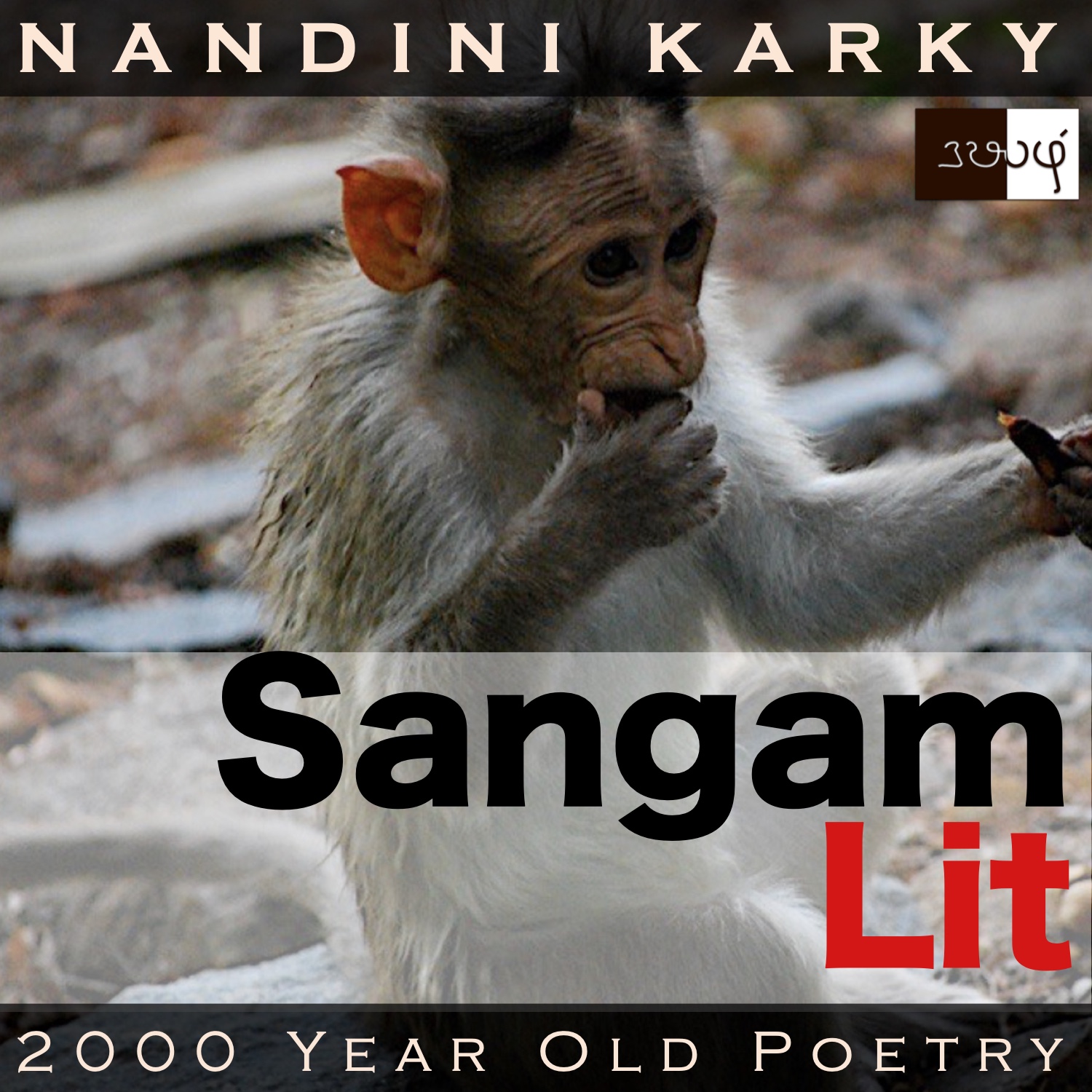Podcast: Play in new window | Download
Subscribe: Apple Podcasts | Spotify | Amazon Music | Android | iHeartRadio | TuneIn | RSS | More

In this episode, we listen to a curious conversation with millets, as depicted in Sangam Literary work, Natrinai 251, penned by Madurai Perumaruthan Ilanaakanaar. The verse is set in the mountain country of ‘Kurinji’ and speaks in the voice of the confidante to millets growing in the field, conveying a hidden message to the man, listening nearby.
நெடு நீர் அருவிய கடும் பாட்டு ஆங்கண்,
பிணி முதல் அரைய பெருங் கல் வாழைக்
கொழு முதல் ஆய் கனி மந்தி கவரும்
நல் மலை நாடனை நயவா, யாம், அவன்
நனி பேர் அன்பின், நின் குரல் ஓப்பி,
நின் புறங்காத்தலும் காண்போய், நீ? என்
தளிர் ஏர் மேனித் தொல் கவின் அழிய,
பலி பெறு கடவுட் பேணி, கலி சிறந்து,
நுடங்கு நிலைப் பறவை உடங்கு பீள் கவரும்;
தோடு இடம் கோடாய், கிளர்ந்து,
நீடினை விளைமோ! வாழிய, தினையே!
Opening with ‘நெடு நீர் அருவி’ meaning ‘waterfalls, falling from a great height’, the song transports us instantly to a moisture-filled mountain land. ‘கடும் பாட்டு’ talks about ‘loud sounds’ that would inevitably accompany this waterfall. After satisfying our senses of sight and sound, now the poem evokes the sense of taste with mention of ‘பெருங் கல் வாழை’ or ‘hill banana’. Anyone who has savoured varieties of banana will vouch that the sweetest one is the rich mountain banana. Moving away from this plant to a person, the verse talks about ‘தளிர் ஏர் மேனி’ meaning ‘a form akin to a fresh sprout’. From the personal, the poem moves towards the religious with the words ‘பலி பெறு கடவுட் பேணி’ talking about ‘animal sacrifice rituals to appease god’. The verse ends with ‘நீடினை விளைமோ’ meaning ‘prolong your growth’ and ‘வாழிய, தினையே!’, which means ‘live long, O millets’. What a curious thing to say to crops in the field! Let’s investigate to learn the reason for this request.
The man and lady had been leading a love relationship and the man was intent on trysting with the lady, as she guarded the millet fields during the day. One day, the confidante observes him arriving and pretending not to notice him, she turns to the millet fields, and assuming the voice of the lady, she says, “There, where the tall waterfall surrounds with a loud sound, the mountain plantain, whose trunk has fastened to the ground with thick roots, bursts forth its luscious fruits. These are savoured by the female monkey in the lord’s mountain country. O millets, haven’t you seen how I have protected your fields, by sounding out my sweet voice that arise gratified by the great love of the man from the mountain country, whom I love dearly? Now, my form, akin to a fresh bud, will lose its past beauty and seeing this, sacrificial rituals will be arranged to appease god with much uproar. And so, flocks of birds will steal you away, as you start to bloom. Bend not your heads in full bloom. Stand upright and delay your growth. May you live long, O millets!” With these words, the confidante is persuading the man to seek the lady’s hand in marriage.
How can words addressed to sprouts in the field sow the intention of marriage in the man? To understand how, we have to delve into the metaphor and meaning hidden within. The confidante starts by describing the man’s mountain country and says it’s a beautiful land, where waterfalls resound and where plantain trees hang with delicious fruits, which are then savoured eagerly by the female monkey. After describing the man’s land thus, the confidante says it’s the man’s love that has made the lady happy in her work of chasing the birds from the millet field. As we have seen in many other poems, the primary task of young girls in the mountain country was to guard the millet fields from the attack of those parrot pirates. The confidante addresses these words to the millets and says you know this well. Then, from the present, she moves to predictions of the future. She says the lady’s form will be ruined and seeing this, mother would arrange for rituals to appease god Murugu and also, confine the lady to the house. Owing to this, the lady will not be able to guard the fields. Thereby, the crops are sure to be stolen away by invading bird flocks. So, she suggests to those crops not to bloom and bend the stalk, but to stand upright and delay the time of their growth. As if words have the power to bend nature to one’s will!
Unraveling the details in the verse, we understand that the harvest season was seen as the right time for marriage. So, when the confidante requests the crops to delay their growth, she’s telling the man it’s time he rushed to seek the lady’s hand in marriage. Failing which, the lady would suffer in pining and seeing those changes in the lady, the lady’s mother would confine her to the house and the man would not be able to relish her company. The confidante conceals the right course of action in the metaphor, where the monkey relishes the sweet fruit amidst the applause of the mountain waterfalls, and likewise, the man must formalise his union with the lady and savour her company with the blessings and approval of the lady’s kith and kin. Being likened to a monkey is no demeaning thing for the man apparently, but would be taken as a subtle guidance to the right path. A poem that illustrates that the Sangam poets were indeed magicians with metaphors!




Share your thoughts...